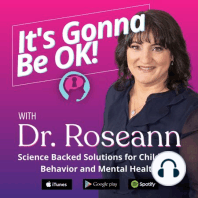4 min listen

155: Self-Regulation in the Classroom
FromScience Backed Solutions for Children’s Behavior and Mental Health
155: Self-Regulation in the Classroom
FromScience Backed Solutions for Children’s Behavior and Mental Health
ratings:
Length:
14 minutes
Released:
Jan 17, 2024
Format:
Podcast episode
Description
Navigating self-regulation in the classroom is crucial, and often, parents may not recognize issues until their children face the structured environment of school. Overstimulated behaviors or emotional challenges may be evident at home, but cognitive, social, or prosocial issues might go unnoticed. In today’s episode, we’ll delve into the significance of self-regulation in the classroom, exploring how emotional and behavioral dysregulation may only surface under the pressure of academic demands.Early identification of learning issues is essential.A child struggling with impulsivity and difficulty in transitioning or regulating behavioral responses creates an unstable foundation for all learning endeavors. Although bright children may compensate with intellect, the absence of self-regulation becomes apparent later, impacting performance in middle school, the teenage years, and beyond.Internal regulation is crucial across various aspects of life, such as academics, work, and relationships considering that a lack of self-regulation can hinder a child's progress, especially during key developmental stages like transitioning from learning to read to reading to learn. Early identification of learning issues is essential, and many dysregulated children are now flagged at an early stage. Recognizing and addressing self-regulation challenges in the classroom is vital for a child's long-term success in learning and beyond. This proactive intervention not only aids in creating a conducive learning environment but also sets the stage for holistic development. Early identification provides an opportunity to implement targeted strategies, personalized interventions, and supportive measures tailored to the unique needs of each child.The importance of self-regulation in the classroom and its impact.Being self-regulated has significant benefits. Not only does it make learning easier, but it also reduces the need for extra support. It fosters better relationships with peers, making the school experience more enjoyable. However, for struggling students, the lack of self-regulation can lead to social and educational challenges.Teachers play a crucial role by modeling desired behaviors without shaming, creating a positive environment for emulation. Additionally, incorporating goal-setting and planning into the curriculum addresses the executive functioning skills often lacking in dysregulated students. By teaching them to envision future outcomes and plan accordingly, educators can guide students toward organized and purposeful behavior. Self-regulation strategies for children.Enhancing emotional regulation in schools is becoming increasingly crucial, especially in the current pandemic scenario where the prevalence of emotional and mental health challenges continues to increase. The heightened stress and uncertainties brought about by the pandemic underscore the essential role of emotional well-being in fostering a conducive and supportive learning environment. Recognizing and actively working towards enhancing emotional regulation is pivotal in ensuring the holistic development and well-being of students in these challenging times.Teaching emotional regulation within a school setting brings about various benefits. It not only addresses emotional issues but also has a positive impact behaviorally. Moreover, schools can directly teach organizational skills, particularly to dysregulated and disorganized students. This includes guiding them on how to organize items, themselves, and prepare for events through role-playing and previews. By integrating emotional regulation and organizational skill instruction, schools create a comprehensive approach to fostering well-rounded development in students, addressing both their emotional and behavioral needs.Furthermore, incorporating pro-social activities into the school
Released:
Jan 17, 2024
Format:
Podcast episode
Titles in the series (100)
It's Gonna Be Ok! by Science Backed Solutions for Children’s Behavior and Mental Health